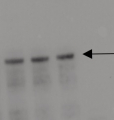1

Anti-ASY1 | Asynaptic phenotype protein 1 (monoclonal)
AS08 338 | Clonality: Monoclonal | Host: Mouse | Reactivity: Triticum aestivum
- Product Info
-
Immunogen: KLH-conjugated synthetic pepitde chosen from Triticum aestivum ASY1 UniProt: A7TVU8
Host: Mouse Clonality: Monoclonal Purity: Total IgG. Protein G purified purified from Cell culture supernatant. Format: Lyophilized Quantity: 50 µg Reconstitution: For reconstitution add 50 µl of sterile water/tube Storage: Store lyophilized/reconstituted at -20°C; once reconstituted make aliquots to avoid repeated freeze-thaw cycles. Please remember to spin the tubes briefly prior to opening them to avoid any losses that might occur from material adhering to the cap or sides of the tube. Tested applications: ELISA (ELISA), Western blot (WB) Recommended dilution: 1: 10 000 (ELISA), 1: 1000 (WB)
Expected | apparent MW: 66.3 kDa - Reactivity
-
Confirmed reactivity: Triticum aestivum Predicted reactivity: Triticum aestivum
Not reactive in: No confirmed exceptions from predicted reactivity are currently known - Additional Information
-
Additional information (application): This antibody does not work in immunolocalization - Background
-
Background: Pairing and synapsis of homologous chromosomes is required for normal chromosome segregation and the exchange of genetic material via recombination during meiosis. Synapsis is complete at pachytene following the formation of a tri-partite proteinaceous structure known as the synaptonemal complex (SC). In yeast, HOP1 is essential for formation of the SC, and localises along chromosome axes during prophase I. Homologues in Arabidopsis (AtASY1), Brassica (BoASY1) and rice (OsPAIR2) have been isolated through analysis of mutants that display decreased fertility due to severely reduced synapsis of homologous chromosomes. Analysis of these genes has indicated that they play a similar role to HOP1 in pairing and formation of the SC through localisation to axial/lateral elements of the SC.
- Product Citations
-
Selected references: Lewandowska et al. (2021) The proteome of developing barley anthers during meiotic prophase I. J Exp Bot. 2021 Nov 10:erab494. doi: 10.1093/jxb/erab494. Epub ahead of print. PMID: 34758083.
Darrier et al. (2019). Following the Formation of Synaptonemal Complex Formation in Wheat and Barley by High-Resolution Microscopy. Methods Mol Biol. 2020;2061:207-215. doi: 10.1007/978-1-4939-9818-0_15. - Protocols
-
Agrisera Western Blot protocol and video tutorials
Protocols to work with plant and algal protein extracts
Agrisera Educational Posters Collection - Reviews:
-
This product doesn't have any reviews.
Accessories

This product can be purchased in 3 different volumes:
AS16 ECL-S-10, 10 ml. Trial size limited to one per customer
AS16 ECL-S-100, 100 ml
Choose the appropriate volume in the drop down menu to the right



